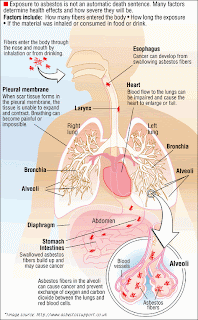Mesothelioma is a rare form of cancer. It is used to describe a cancerous tumor which involves the mesothelial cells of an organ, usually the lungs or abdominal organs.
The most common type of mesothelioma is the pleural mesothelioma. The pleura is a thin membrane found between the lungs and the chest cavity. It provides a lubricated surface so that the lungs do not chafe against the chest walls. Thus, a pleural mesothelioma is often referred to as a “lung” cancer.
Another form of mesothelioma is the peritoneal mesothelioma. The peritoneum is the membrane that encloses the organs of the abdomen. While peritoneal mesothelioma is less common than pleural mesothelioma, it tends to be more invasive, and may thus result in a shorter life expectancy for the patient. Mesothelioma has also been found in the stomach and other abdominal organs.
Why Me?
A common question posed by persons afflicted with mesothelioma is, “Why did this disease develop in me?” The answer is nearly always the same-exposure to asbestos. When diagnosed in the United States, its onset is typically linked to a history of exposure to asbestos fiber. Asbestos is a mineral that was used for decades as a thermal insulation material. It has been widely known since the 1920’s that asbestos is a carcinogen, which means that it causes cancer in humans. However, asbestos was used as an insulator until the mid-1970’s, and is still present in massive quantities in many buildings today. Unfortunately, in many cases very little exposure is required to set this cancer in motion.
Mesothelioma symptoms can be very general and therefore they are often ignored. In most cases, symptoms for this type of cancer arise 2 to 3 months before the cancer is found.
Management of mesothelioma depends largely on the staging of the tumor. Early diagnosis and surgical intervention may lengthen life expectancy. Depending on the age and physical condition of the patient, however, surgery may not be a viable option. In addition to surgical options, radiation treatment and chemotherapy may be helpful in the overall therapeutic program. Pain management and home care are typical alternatives in the later stages of the disease.
See below to learn about the respective symptoms of each type of mesothelioma.
Peritoneal mesothelioma symtoms include:- Wight loss
- Vomiting
- Nausea
- Belly painPleural mesothelioma symptoms include:- Trouble swallowing
- Tireness
- Weight loss
- Progressive loss of appetite’
- Fluid in the ches cavity called “Pleural effusions”
- Pain at the side of the chest or the lower back
- Fever
- Difficulty sleeping
- Cough
Where Do I Go From Here?
After diagnosis, it is important to understand your treatment options. Your doctor or oncologist will provide you with information on the treatments that are available to you.
It is also important to know about your legal rights. If you have mesothelioma, or any other asbestos-related disease, you were most likely exposed to asbestos. Many of the manufacturers of asbestos insulation products knew for decades that asbestos was hazardous, yet made a business decision not to warn people of those hazards. As a result, you may have a right of recovery against those manufacturers, which can help defray the costs of treatment and provide compensation for your pain and suffering.



No comments:
Post a Comment